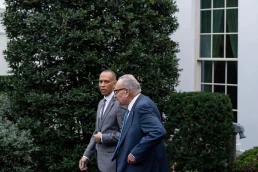“The Cemex decision reaffirms that elections are not the only appropriate path for seeking union representation, while also ensuring that, when elections take place, they occur in a fair election environment,” said the NLRB chair.
by Jessica Corbett, Common Dreams
The National Labor Relations Board on Friday announced a new framework for determining when companies must bargain with unions without an election—a policy that supporters said will make union-busting much more difficult.
Following the NLRB’s decision in Cemex Construction Materials Pacific, when workers ask an employer to voluntarily recognize a union as their bargaining representative, the company can voluntarily do so and begin good-faith negotiations.

Alternatively, the company may file a petition seeking an election, and as long as it does not commit unfair labor practices, one will be held. However, if a company does engage in such violations—or refuses to voluntarily recognize a union and fails to file a petition—the NLRB will now order the employer to recognize and bargain with the union without an election.
In other words, “union-busting just got a lot harder,” More Perfect Unionsaid on social media. “This brings the board’s position closer to the old Joy Silk doctrine, which held that if a majority of workers signed union cards, there didn’t need to be an election at all and bosses just had to recognize the union and bargain in good faith.”
The Joy Silk doctrine came from a 1949 NLRB decision and was replaced by the Gissel doctrine in a 1969 U.S. Supreme Court case.
Brishen Rogers, a professor at Georgetown University Law Center, said on the social media platform X that “Cemex may be the most important NLRB decision in a generation.”
It is “hard to say if it will survive review,” Rogers added. “But labor and the state can use it to change power alignments right now through organizing—which in turn would *help* it survive review.”
In the case of Cemex—a U.S. subsidiary of a multinational that provides ready-mix concrete, cement, and aggregates to the construction industry—the NLRB “found that the employer engaged in more than 20 instances of objectionable or unlawful misconduct during the critical period between the filing of the election petition and the election,” the agency said in a statement. “Accordingly, the board found that the employer was subject to a bargaining order under both the Supreme Court’s decision in NLRB v. Gissel Packing Co. and under the newly announced standard, applied retroactively in this case.”
NLRB Chair Lauren McFerran connected the Cemex decision and the board’s Thursday rollback of policies established under the Trump administration that dragged out union elections—a move also welcomed by workers and labor rights advocates.
“Today’s decision, along with the board’s recently issued final rule on representation, will strengthen the board’s ability to provide workers across the country with a timely and fair process for seeking union representation,” McFerran said. “The Cemex decision reaffirms that elections are not the only appropriate path for seeking union representation, while also ensuring that, when elections take place, they occur in a fair election environment. Under Cemex, an employer is free to use the board’s election procedure, but is never free to abuse it—it’s as simple as that.”
Recent Posts
Leading Papers Call For Destroying Iran To Save It
February 11, 2026
Take Action Now The opinion pages of the New York Times and Washington Post are offering facile humanitarian arguments for the US to escalate its…
Despite Marco Rubio’s Warnings, This is the Time to Go to Cuba in Solidarity Against the Latest U.S. Aggressions
February 10, 2026
Take Action Now When visiting Cuba, one can see quickly the terrible effects of the almost seven decades of the U.S. economic blockade of Cuba.By…
“Hands Off Cuba!”: Left Groups in Europe Mobilize Against U.S. Aggression
February 10, 2026
Take Action Now Hundreds demonstrated in Belgium in solidarity with Cuba as further mobilizations against US imperialism are planned across Europe.……
Democrats Propose Minor Reforms for ICE — and Record Funding
February 10, 2026
Take Action Now Congressional Democratic leaders are asking ICE to agree to reforms, promising to vote for $11 billion in funding for the agency if…




